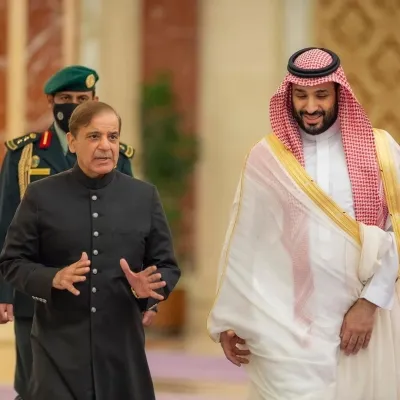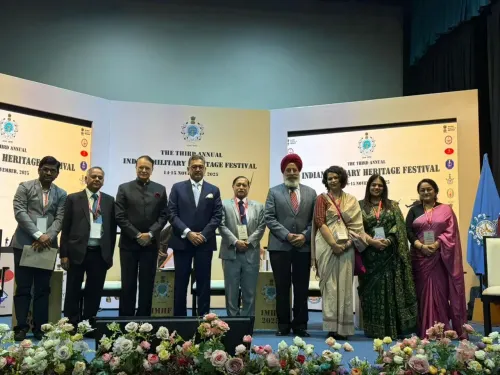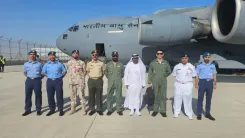Is the Pak-Saudi Agreement a Reflection of the Middle East's Turbulence?

Synopsis
Key Takeaways
- The Strategic Mutual Defence Agreement between Saudi Arabia and Pakistan reflects changing alliances in the Middle East.
- The agreement does not weaken India-Saudi relations but poses challenges for India.
- Geopolitical tensions are increasing, particularly between Iran and Israel.
- China's involvement with Pakistan could further complicate regional dynamics.
- India must maintain a strategic approach to its foreign policy amidst these developments.
New Delhi, Sep 28 (NationPress) The Strategic Mutual Defence Agreement established between Saudi Arabia and Pakistan on September 17 in Riyadh must be interpreted against the backdrop of the escalating conflicts in the Middle East; this development in no way reflects a weakening of the enduring bond between Saudi Arabia and India.
This agreement is perceived by some strategic experts as a form of Islamic NATO, particularly due to a clause stating that ‘any act of aggression against either nation will be regarded as an act against both,’ mirroring the ‘collective defense’ stipulation from NATO’s founding treaty in 1949. Pakistan, a long-time member of the Organisation of Islamic Cooperation (OIC), has historically been viewed by Saudi Arabia, which has traditionally chaired the OIC, as a primary source of military support for its defense requirements.
Historically significant was the 1979 incident when a group of Islamic extremists attacked the Grand Mosque, challenging the Saudi monarchy’s claim of custodianship over the holy sites of Mecca and Medina. Pakistan's military was deployed to protect the mosque and disperse the assailants.
In the years following, approximately 20,000 Pakistani troops were stationed in Saudi Arabia. This scenario illustrates Pakistan’s commitment to the protection of the ‘Ummah’, a stance it has maintained since the presidency of General Ziaul Haq. The term ‘Islamic NATO’ arises from Pakistan’s readiness to serve as a ‘defender of faith’ in the OIC.
Recent events in the Middle East, particularly the military tensions between Israel and Iran, have paved the way for the Saudi-Pakistan agreement. Iran, a Shiite fundamentalist state, stands opposed to the United States and has garnered support from both Shiite factions, such as Hezbollah and the Houthis, and more significantly, from Hamas, a Sunni militant group.
Following the October 7, 2023, Hamas attack on Israel, which resulted in the deaths of around 1,200 Israelis and the kidnapping of 250, including women and children, Israel retaliated with full force, aiming to dismantle the terror group. Former President Donald Trump offered his unwavering support, urging swift action from Israel.
Iran intervened militarily on behalf of Hamas, prompting U.S. actions against Iran, including the deployment of bunker-buster bombs on Iranian nuclear sites. Israel perceives a nuclear-armed Iran as a grave threat and preemptively targeted its uranium enrichment facilities, with the U.S. also conducting strikes.
The Israel-Iran conflict has increasingly taken on the appearance of a potential ‘clash of civilizations’ between Islam and Zionism. Meanwhile, geopolitical shifts have seen China and Russia aligning with Iran, hinting at a revival of Cold War-era dynamics.
While Saudi Arabia has historically been allied with the U.S., it is wary of excessive escalation in the Middle East due to the Iran-Israel conflict. The defense agreement with Pakistan serves as a protective measure in a rapidly changing geopolitical landscape.
Pakistan is keen to preserve its ties with Saudi Arabia while ensuring that the agreement does not jeopardize its own relations with the U.S. or China.
Pakistan has adeptly positioned itself as a facilitator in U.S.-Taliban negotiations, assisting the Biden Administration’s troop withdrawal from Afghanistan in 2020. Since then, it has maintained favorable relations with radical Islamic factions and permitted the proliferation of extremist groups within its borders, which have engaged in cross-border militancy against India in Kashmir.
The urgency of the Pak-Saudi agreement was underscored by an Israeli missile strike on a residential area in Doha on September 8, aiming at Hamas leaders gathered there as part of a Qatari initiative following Trump's recent push for a ceasefire in Gaza. Six individuals were reported killed, though Hamas leaders survived. Israel justified this action as retaliation for a prior shooting in Jerusalem that resulted in six Israeli deaths.
Israel has prioritized Hamas’s complete defeat over any ceasefire discussions, an approach seemingly supported by the U.S. The developments concerning Gaza and the escalating Iran-Israel hostilities are compelling U.S. allies like Saudi Arabia to explore alternative security arrangements.
Saudi Arabia is mindful of its relationship with India and is unlikely to undertake actions that could jeopardize it. However, Pakistan is eager to enter into a defense pact with Saudi Arabia, which could lead to significant Saudi investments in Pakistan and bolster its position against India, potentially diverting U.S. military resources and garnering broader support from Muslim nations in the event of conflict with India. The OIC has already shown support for Pakistan regarding Kashmir and has encouraged dialogue between India and Pakistan.
India's relations with Riyadh remain distinct from Saudi Arabia's connections with Islamabad, influenced by historical ties, economic interests, and the Indian diaspora. The initial response from India’s Ministry of External Affairs, emphasizing the need for Riyadh to consider ‘mutual interests and sensitivities,’ was a fitting reaction.
India's concerns regarding the Strategic Defence pact between Pakistan and Saudi Arabia stem from the advantage it provides Pakistan in rallying Islamic world support for its Kashmir agenda, the implications of the Sino-Pak strategic partnership against India, and indications from the Trump administration of a renewed focus on trade with Pakistan, despite Trump's vocal opposition to Islamic terrorism.
Recently, the OIC's pro-Pakistan rhetoric has intensified, even with Saudi Arabia's leadership of this 57-member organization. During the OIC Contact Group meeting on Jammu & Kashmir on March 16, 2023, the Secretary General reaffirmed the OIC's commitment to supporting the people of Jammu & Kashmir in their quest for ‘self-determination.’ Following a devastating terror attack in Pahalgam attributed to Pakistan, the OIC issued a concerning statement dismissing India's accusations against Pakistan as ‘unfounded.’
In the wake of the military tensions between India and Pakistan post-Pahalgam, China has directly provided military and technological support to Pakistan, escalating its antagonism towards India. Trump's claim of mediating a ‘ceasefire’ between the nuclear powers was leveraged by Pakistan’s military leadership, who called for the Nobel Peace Prize for Trump, while India maintained that it accepted the ceasefire at the request of Pakistan's Director General Military Operations.
Pakistan has effectively managed to keep the U.S. geopolitically aligned with its interests, despite Trump later retracting his suggestion of being open to facilitating India-Pakistan negotiations on Kashmir, clarifying his stance against ‘third-party mediation’.
As indicated, India does not perceive the Saudi-Pak Strategic Defence pact as a threat to its relationship with Saudi Arabia. However, it must consider the implications for Indo-Pak relations. Pakistan is likely to continue fostering faith-based militancy in Jammu & Kashmir—historically, the Pak ISI played a role in the expulsion of Kashmiri Pandits in the 1990s to bolster its claim over the predominantly Muslim valley along communal lines. The recruitment of terrorists through indoctrination and the use of social media to create ‘sleeper cells’ in the valley persists. The deteriorating situation in the Middle East, exacerbated by a shift towards religion-driven conflicts, poses an ongoing challenge for India, while Pakistan appears unconcerned.
India must persist in denouncing faith-based terrorism on all global platforms, while promoting the democratization of Middle Eastern states governed by fundamentalist ideologies. The Indo-U.S. relationship should emphasize the natural alliance between the two largest democracies, regardless of the transactional nature of some of Trump's statements. While trade and visa matters may require negotiation, India must assert its sovereignty against U.S. interests whenever necessary.
(The writer is a former Director of the Intelligence Bureau)









